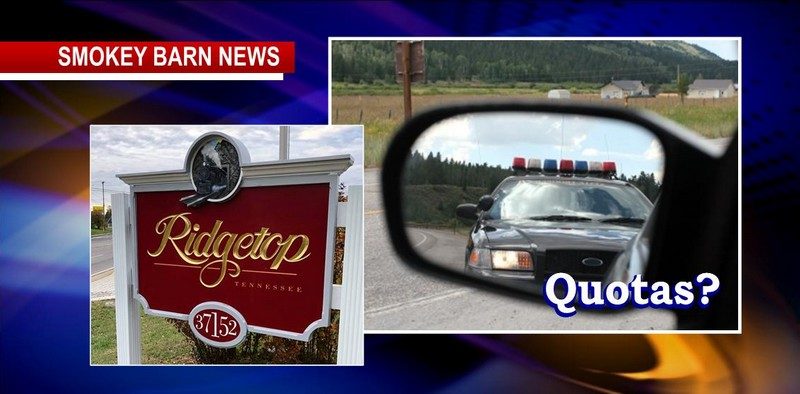
Ridgetop Investigation: Are Ticket Quotas Really Illegal?
The Unpopular Facts
RIDGETOP TENNESSEE: (Smokey Barn News) – Recently the city of Ridgetop found itself in the news after the city’s current Police Chief Bryan Morris alleged that his department has ticket quotas assigned by the city’s Vice Mayor.
Morris told Smokey Barn News that Vice Mayor McCaw Johnson told him that his department needed to issue 210 tickets a month to meet budgetary needs. (Full story) Morris said that he told Johnson “That’s against the law.” The encounter with Johnson was recorded and subsequently released to the press but are ticket quotas really against the law in Tennessee, the short of it is, no.
Let’s look at the statute used to support the premise that ticket quotas (all by themselves) are illegal. Smokey Barn News has highlighted words that direct the meaning of the statute to help you get to the same place we are.
Statute 39-16-516 2014 reads;
“A political subdivision or any agency of this state may not establish or maintain, formally or informally, a plan to evaluate, promote, compensate, or discipline a law enforcement officer solely by the issuance of a predetermined or specified number of any type or combination of types of traffic citations.
(b) A political subdivision or any agency of this state may not require or suggest to a law enforcement officer that the law enforcement officer is required or expected to issue a predetermined or specified number of any type or combination of types of traffic citations within a specified period.
(c) Nothing in this section shall prohibit a municipal corporation, a political subdivision or any agency of this state, from establishing performance standards for law enforcement officers that include issuance of traffic citations, but do not require issuance of a predetermined or specified number or any type or combination of types of citations as the sole means of meeting such performance standards.
The following breakdown comes from numerous professionals in both the public and the private sector. No one wanted to go on record because the issue is very unpopular but most were willing to talk to us anonymously.
The words “sole,” “solely” and the term”performance standards” are the terms that really drive the statute. Even though (B) says you can’t have a quota, (A) and (C) say you can.
Here’s an example; in Tennessee, a city or government agency can require it’s officers to have ticket quotas, however, if an officer does not meet the set quota you can not use that single factor (all by itself) to evaluate, promote, compensate, or discipline (which would likely include firing) an officer.
In other words, if you are going to fire an officer you can not do it based “solely” on ticket quotas. If an officer is late to work all the time, repetitively files police reports incorrectly and does not meet his or her ticket quota and you fire or discipline the officer for those three things then no law has been broken. However, if you fire or discipline an officer “solely” on the basis that they did not meet a ticket quota then you just gave the officer a civil suit against the agency.
Now, all that said, statutes have to be interpreted and judges have the authority to come to whatever conclusion they want, that’s why they call them judges but from what we learned from the numerous professionals we spoke with, whether or not Ridgetop had quotas is academic.
Here’s why it’s so difficult to pull it apart. First, if you speed and get a ticket it doesn’t matter if the officer has a quota or not. Most people believe that ticket quotas will make officers write more tickets, that’s likely true. Does that mean the officer will fabricate tickets to meet a quota, that would depend on the officer’s character but that has nothing to do with this statute.
Even if the officer is trying to meet a quota, “probable cause” gives him or her the authority to pull you over and give you a ticket. Telling the judge the officer’s radar gun is not valid because he or she had a quota won’t help you. If an officer is fabricating evidence to meet ticket quotas that’s more of an issue with the agencies hiring and screening process.
If (B) was the only text in this statute then it would be much easier to call ticket quotas illegal. However, when you add parts (A) and (C) the meaning of the statute changes. The public may hate the very word quota and intuitively you might think quotas are hideous but this statute does not address the public perception of ticket quotas.
Smokey Barn News reached out to the DA’s office in January regarding the allegations presented by Chief Morris. According to Robertson County Assistant District Attorney Dent Morriss, “An investigation is ongoing.”
If ticket quotas are not illegal then why is there an investigation? Vice Mayor McCaw Johnson was recorded saying that if the department writes an average of 210 tickets a month then the department can offer two junior officers raises and hire an additional officer. Investigators might be looking at the raises Johnson mentioned for the junior officers in the recording and whether or not that constitutes “evaluate, promote, compensate, or discipline.” Remember, it’s the combination of those factors with a ticket quota.
Think of it like this; the state doesn’t likely want officers being evaluated, promoted, compensated, or disciplined solely based on how many tickets they write. The job of an officer entails many things, writing tickets is just a part of the job. In just one afternoon an officer might find themselves responding to a bank robbery, a domestic, and an accident, and yes along the way they’ll write tickets. What makes ticketing different is that it generates income.
Will this situation make lawmakers take another look at the statute? Perhaps but whatever changes are made the statute will need to allow a city, county, and state agencies the ability to regulate officer performance.
Tell us what you think in comments.

Smokey Barn News (Advertisement)
We bring you ALL the News in and surrounding Robertson County, Tennessee.


















